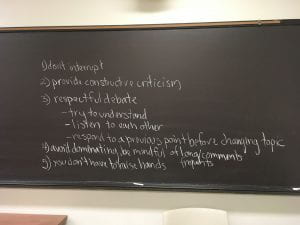When I begin working with a new group of students, I have them reflect together and develop a classroom contract, or rules of engagement. The image above is an example from fall quarter.
These contracts are useful, because they give me something to refer to when checking in with students. I can ask, how are we doing? I can also ask if the rules we established are working for us, or if we would like to modify them.
In an online discussion format, I am even more concerned about rules of engagement. One look at any of the student Facebook pages (UChicago Secrets is a good example) will show how quickly online discourse can devolve into a shouting match. Of course, students know that Canvas for collaborative learning is different than Facebook for whatever Facebook is for, and I do trust them to be more professional in a collaborative learning situation. That said, I worry about tone and intention being misconstrued in online discussion. We’ll need robust rules of engagement.
I plan to share a google doc with students in Week 0 (previously Week 1), and ask them to come up with rules for our new shared environment. In this area of online discussion, they really are the experts in how things can go wrong, but also generate a lot of interest. I am hoping that their experience will help them to help me establish good ground rules for discussion that is engaging but civil.
I am interested to hear how others are handling concerns about the civility of online discourse. What rules for discussion do you think would be helpful?


